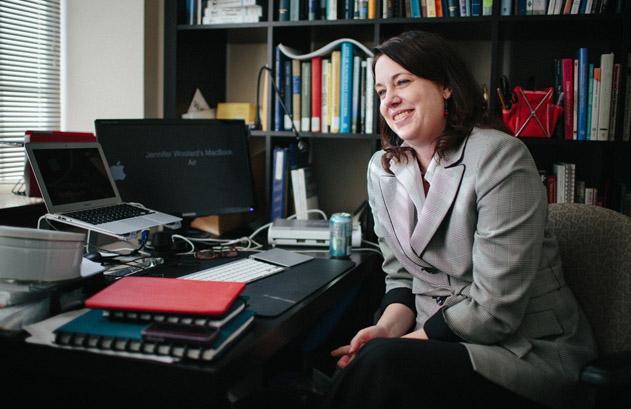Interview Series: Jennifer Woolard
January 29, 2014 – Professor Jennifer Woolard thought she wanted to be a lawyer. Her professional path may have changed, but she still helps families navigate the juvenile justice system.
“My background is in studying kids’ development capacities and their families—and how that plays out in the justice system and social services system,” Woolard explained. “I’m really interested in this intersection of kids, families, and the justice system process. I find it to be an incredibly complicated process to navigate,” she continued.
Woolard, along with colleagues at the University of Massachusetts Medical Center, recently received a grant from the Department of Justice’s National Institute of Justice. Her project will help the DOJ “examine the status of the indigent defense system in the United States.” The DOJ has recently been interested in investigating the juvenile justice system after a scandal known as “Kids for Cash.”
In a Pennsylvania county, juvenile judges were “investors” in a private juvenile correctional facility. “Judges would convict juveniles in front of them and send them to that correctional facility for their punishment. Then, [they] would receive money back from the owner [of the facility],” she explained.
“Many of the kids sent to this correctional facility did not have lawyers represent them during juvenile court hearings,” she continued. “This is not entirely unusual.”
The juvenile justice system is a “hybrid model.” It is not a full criminal model. Instead it is a combination of rehabilitation and social control. According to Woolard, legal representation rates in juvenile court vary dramatically.
“In assessment of this scandal, everyone realized that had their been lawyers present, it’s much less likely that kids for very minor things would have received an adjudication of going to a secured correctional facility.”
Over the next 30 months, Woolard will also study what leads adolescents to waive their right to counsel in juvenile court. During this study, she will also research an element often ignored: the relationship between kids and their parents. “When a kid is actually going through the system, they are not randomly assigned to an adult. They have a parent who goes through with them.” She hopes to learn how parents view the system and affect their child’s decisions.
Woolard will study how judges and others speak to juveniles when explaining their rights. “It’s an open question how much kids understand and whether the way adults explain [the system] is appropriate and meaningful for kids,” she continued.
“[The study] is going to examine kids and their parents, their understanding of what the right to counsel means, their understanding of what waiving that right means, and the implications of waiving that right.” The project will also investigate “what are the factors that might influence them in their decision,” she said. To understand what factors influence adolescents when they commit crimes and when they interact with the justice system, Woolard looks to a developmental psychology approach.
“Kids, more often that adults, focus on the short-term consequences of a decision and ignore the long-term,” she said. Adolescents are more likely to be influenced by peer pressure, and they demonstrate a greater preference for risky behavior. “From developmental research, we know those issues change through development.”
Woolard has received a lot of support for practitioners in the juvenile justice system. “I think it’s so important that we partner with people in the justice system to do the work, as opposed to inventing [procedure] here on the computer,” she said. She prefers to create research projects that can work in tandem with local justice systems and be useful to kids, families, and legal professionals.
“How do we design research from the beginning that’s going to be legally relevant and practical? It’s one of the more interesting and challenging aspects of our work.”
—By Elizabeth Wilson
